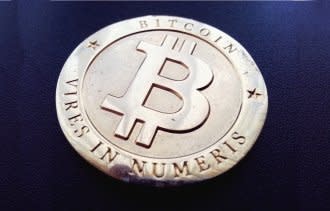Cash, Credit or Gold?

Is cash becoming obsolete? "Contactless" payment systems, like Apple Pay and Google Wallet, digitize debit and credit cards in a virtual wallet, letting you pay for a variety of services and products from the convenience of your phone. Apps like PayPal’s Venmo let users send money instantly, splitting the cost of brunch or reimbursing friends for movie tickets with just a few taps. And, despite ongoing growing pains, Bitcoin, the open-source currency project, continues to live on.
Related: Why Billionaire Investor Reid Hoffman Is Betting Big on Bitcoin
The next payment frontier? Digital payments in gold. Already, the Canadian startup BitGold is advancing the digital payment revolution with a simple mission: Help people securely acquire, store and spend gold. Customers are being offered a prepaid card for spending their gold or converting gold payments into currency at any ATM machine.
If this sounds a bit like a science fiction movie, you’re not alone in that thought. But, after years of serious credit-card hacking scandals, could customers finally be ready to say goodbye to credit cards and hello to digital payments, including BitGold? Here’s what your business needs to know about the choices of cash, credit or gold.
Credit card theft and data breaches: Is any payment source safe?
Each new day seems to find a new data security breach. In 2013, Target made headlines when hackers stole credit card data from more than 40 million accounts. A federal judge later ruled that Target had to pay its hack victims up to $10 million.
And that's not all: Last year, an estimated 21.5 million Americans were affected by a colossal breach of government computer systems, where hackers made off with a “vast trove of personal information” that included fingerprints and Social Security numbers. The hack was believed to have originated in China, although government officials declined to pinpoint a specific perpetrator.
Related: Would You Work Out Harder If You Got Paid in Bitcoin?
With a new identity fraud victim every two seconds, 12.7 million U.S. consumers in 2014 suffered an estimated $16 billion in losses, according to the 2015 Identity Fraud Study from Javelin Strategy & Research. With identity theft and fraud complaints on the rise -- and the federal government seemingly unable to protect sensitive information from data breaches -- it’s natural to wonder if any payment source is safe.
How one contactless system, Apple Pay, has answered the security threat.
Safer payments are the goal behind a contactless payment plan like Apple Pay. Apple has made a big deal out of its Apple Pay system, arguing that it’s more secure than other such systems because Apple Pay transactions are verified with a fingerprint. Apple claims that since it never reveals the card number or details to a merchant at payment, its system is more privacy-focused than others; additionally, payment is authorized using a one-time unique dynamic security code, instead of the code from the back of the card.
Card payment is tied to each device; information is never uploaded to iCloud or Apple ID accounts.
Despite these big promises, Apple Pay adoption has been slow. Consumers feel that swiping or dipping a credit card is still easier and faster, and credit card issuers have no incentive to promote Apple Pay over the standard card swipe. Breaking consumer habits can be hard, especially for financial services. Banks, for example, are still trying to sell older consumers on the security of digital check deposits via smartphone apps.
Given Apple's challenge of trying to convince consumers to pay with their iPhones, does something as extreme as digital gold payment even have a chance?
Will 'digital payments in gold' take off?
BitGold is a brand new platform offering customers the ability to pay digitally with gold. Despite the name, BitGold is much more like PayPal than bitcoin; BitGold is not a “bitcoin” backed by gold, nor is it an anonymous system. Instead, BitGold is a system that knows its customers, protects them from fraud and can reverse transactions, should fraud be detected.
BitGold is also an incredibly interesting idea. It’s founded on the belief that gold provides a neutral, natural unit of account in relation to other elements; and it’s an elemental unit of accounting for past, present and future transactions, making it a natural unit for online savings and trade in an age of global cooperation. BitGold’s chief marketing challenge is selling this belief, in tandem with its system for acquiring, storing and process gold-backed payments.
Related: It's Crucial to Keep Up With These 6 Digital Trends in 2016
Bottom line
While it’s still early in BitGold’s development, the possibility of paying for transactions with gold is certainly intriguing, especially in a world that’s increasingly dominated by credit card theft, rampant debt and data security breaches. The evolution of digital payments in gold is one financial trend to watch closely in months to come. And, you never know: Apple Pay may yet take off.

 Yahoo Finance
Yahoo Finance 
